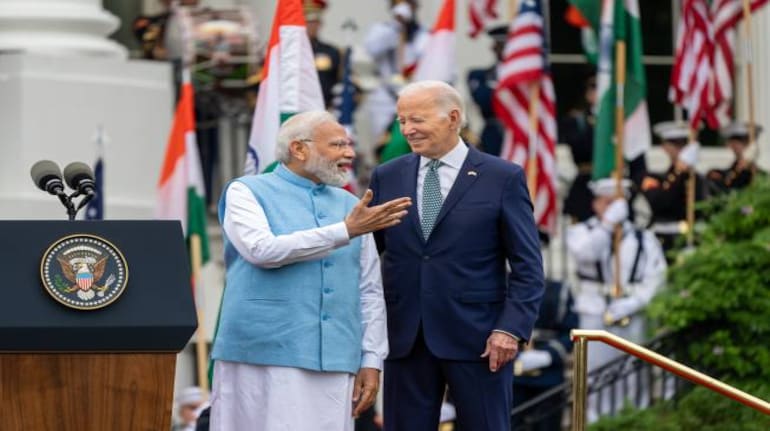
The Group of Twenty (G20) leaders set aside their differences over the ongoing Ukraine war and adopted the Delhi Declaration on Saturday. The fact that consensus could be achieved not only on Ukraine but on more than 100 issues on the agenda, is being widely seen as a big feather in India’s cap.
One of the significant departures from earlier summits was the absence of any critical reference to Russia over the Ukraine war. The only mention of the country was in respect to the Black Sea grain deal, and the need to revive it to ensure that food and other essential commodities reach the larger world, especially the poor in Africa.
India, which acted as “the voice of the global South” (comprising the poor and developing countries in the world) had proposed the inclusion of the African Union (AU) as a permanent member of the group.
The consensus among the members to include the AU as the 21st member of the G20 is being attributed to India.
“United in consensus and spirit, we pledge to work collaboratively for a better, more prosperous and harmonious future. My gratitude to all fellow G20 members for their support and cooperation,” Prime Minister Modi said in a social media post.
India’s supporters
The 34-page document was adopted after over 200 hours of “ruthless negotiations,” said officials.
The support of other emerging economies like Brazil, South Africa, and Indonesia were crucial in achieving consensus on all the issues, particularly Ukraine.
The phone conversation between Russian President Vladimir Putin and Modi a few days before the summit was also important. Putin called to inform Modi of his inability to come to New Delhi because of the ongoing war in Ukraine. But he extended full support for a successful summit under India’s presidency.
Similarly, the dinner the Prime Minister hosted for US President Joe Biden on the eve of the summit was also significant in convincing the Group of Seven countries — an important bloc within the G20 — to make all efforts for a successful end to the Delhi summit.
This is not to ignore the hard work of the Indian and other diplomats to iron out the differences and come out with the wording on key issues that's acceptable to all the countries in the grouping.
Ukraine a divisive issue
Since the war began in February 2022, Ukraine has triggered a sharp division between the US-led western countries and Russia-China. While other countries remained neutral, their emphasis was on bringing an early end to the war.
In key meetings in the run-up to the summit, the sharp division among members on Ukraine was clearly noticed, and questions were raised as to whether the New Delhi summit will fail to come up with an agreed final document.
Such apprehensions were moot as the consensus reached at the Bali G20 summit under Indonesia’s leadership last year, gave way within weeks as the Ukraine war intensified.
But the diplomatic acumen of India and other emerging countries, plus the growing realisation in the west that the sufferings of the poor and underprivileged countries of the global South needs to be addressed urgently, played an important role in finding a consensus.
The China factor
Chinese President Xi Jinping also stayed away from the summit in the wake of fresh tension with India in the wake of Beijing releasing a controversial map that showed Indian territories as part of China.
Reports also suggested that he was absent from the New Delhi summit because of domestic crises in the wake of a shrinking economy.
Though it is not clear how China felt about India’s growing diplomatic heft that helped it build a broad consensus among all the members, including Russia, Beijing decided not to stand in the way of the emerging agreement on the final document, so long as its core interests were not jeopardised.
How will it impact the war?
That’s a big question.
A former Indian diplomat remarked, “Documents don’t end wars,” referring to the consensus on Ukraine at the summit.
He claimed the tide was turning for Russia on the battlefield, and as the Delhi summit indicated, diplomatically as well as there was no critical reference to it in the final document.
Since Russia is firmly in control of the areas in Ukraine that are strategically important to it, Moscow might not be averse to ending the conflict now. But the same is not true for Ukraine, which is keen to win back lost territory from Russia.
But mostly, an end to the war will largely depend on when the US wants it to, as US President Joe Biden faces a crucial presidential election within a year.
Discover the latest business news, Sensex, and Nifty updates. Obtain Personal Finance insights, tax queries, and expert opinions on Moneycontrol or download the Moneycontrol App to stay updated!